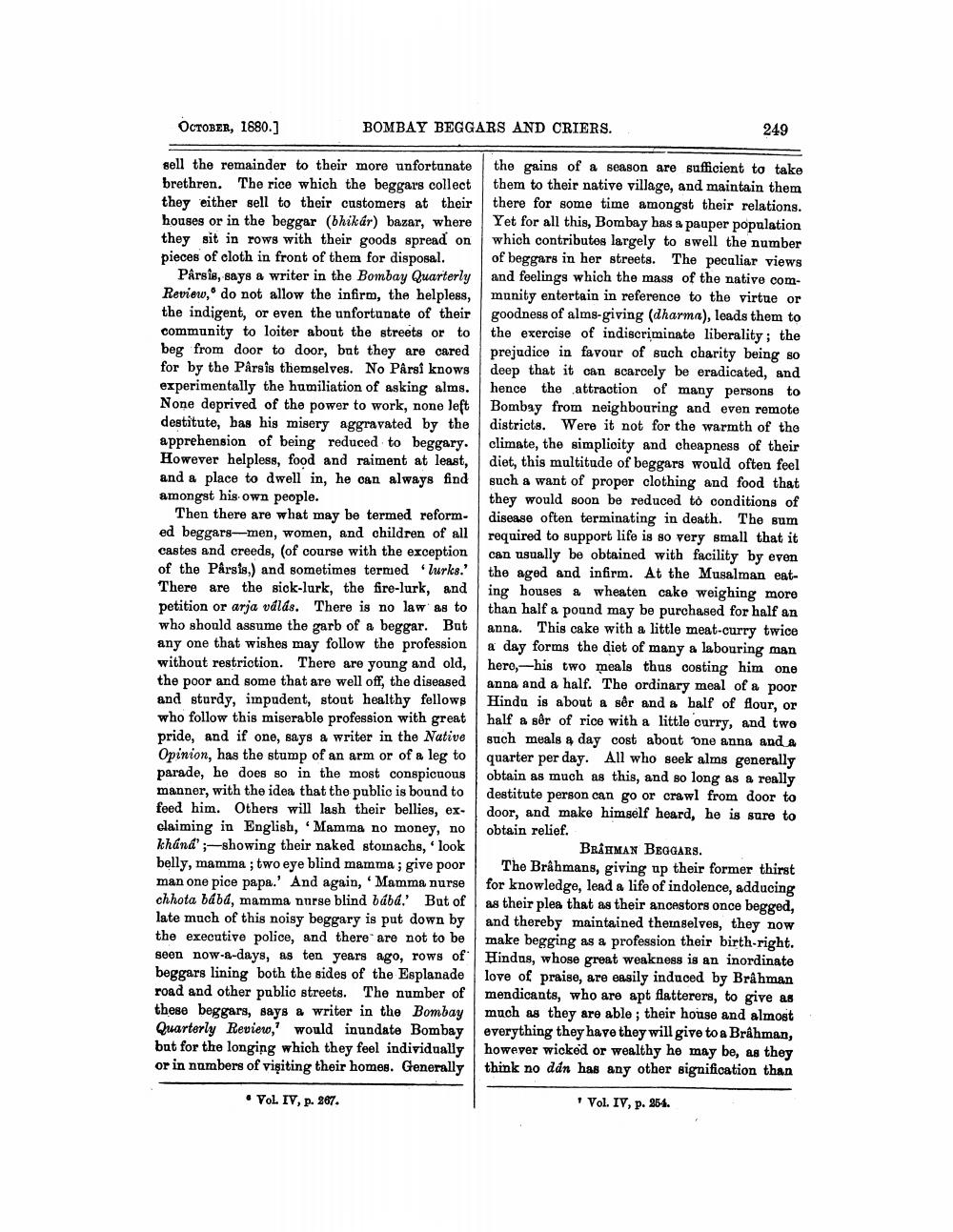________________
OCTOBER, 1680.]
BOMBAY BEGGARS AND CRIERS.
249
sell the remainder to their more unfortunate the gains of a season are sufficient to take brethren. The rice which the beggars collect them to their native village, and maintain them they either sell to their customers at their there for some time amongst their relations. houses or in the beggar (bhikar) bazar, where Yet for all this, Bombay has a pauper population they sit in rows with their goods spread on which contributes largely to swell the number pieces of cloth in front of them for disposal. of beggars in her streets. The peculiar views
Parsis, says a writer in the Bombay Quarterly and feelings which the mass of the native comReview, do not allow the infirm, the helpless, munity entertain in reference to the virtue or the indigent, or even the unfortunate of their goodness of alms-giving (dharma), leads them to community to loiter about the streets or to the exercise of indiscriminate liberality; the beg from door to door, but they are cared prejudice in favour of such charity being so for by the Pârsis themselves. No Pârsi knows deep that it can scarcely be eradicated, and experimentally the humiliation of asking alms. hence the attraction of many persons to None deprived of the power to work, none left Bombay from neighbouring and even remote destitute, bas his misery aggravated by the districts. Were it not for the warmth of the apprehension of being reduced to beggary. climate, the simplioity and cheapness of their However helpless, food and raiment at least, diet, this multitude of beggars would often feel and a place to dwell in, he can always find such a want of proper clothing and food that amongst his own people.
they would soon be reduced to conditions of Then there are what may be termed reform- disease often terminating in death. The sum ed beggars-men, women, and children of all required to support life is so very small that it castes and creeds, (of course with the exception can usually be obtained with facility by even of the Parsis,) and sometimes termed lurks.' the aged and infirm. At the Musalman eatThere are the sick-lurk, the fire-lurk, anding houses wheaten cake weighing more petition or arja válás. There is no law as to than half a pound may be purchased for half an who should assume the garb of a beggar. But anna. This cake with a little meat-curry twice any one that wishes may follow the profession a day forms the diet of many a labouring man without restriction. There are young and old, here, --his two meals thus costing him one the poor and some that are well off, the diseased anna and a half. The ordinary meal of a poor and sturdy, impudent, stout healthy fellows Hindu is about a sêr and a half of flour, or who follow this miserable profession with great half a sêr of rice with a little curry, and two pride, and if one, says a writer in the Native such meals a day cost about one anna and a Opinion, has the stump of an arm or of a leg to quarter per day. All who seek alms generally parade, he does so in the most conspicuous obtain as much as this, and so long as a really manner, with the idea that the public is bound to destitute person can go or crawl from door to feed him. Others will lash their bellies, ex- door, and make himself heard, he is sure to claiming in English, Mamma no money, no obtain relief. kháná' ;-showing their naked stonnachs, look
BRAHMAN BEGGARS. belly, mamma ; two eye blind mamma; give poor The Brâhmans, giving up their former thirst man one pice papa.' And again, 'Mamma nurse for knowledge, lead a life of indolence, adducing chhota baba, mamma nurse blind bába.' But of as their plea that as their ancestors once begged, late much of this noisy beggary is put down by and thereby maintained themselves, they now the executive police, and there are not to be make begging as a profession their birth-right. seen now-a-days, as ten years ago, rows of Hindas, whose great weakness is an inordinate beggars lining both the sides of the Esplanade love of praise, are easily induced by Brahman road and other public streets. The number of mendicants, who are apt flatterers, to give as these beggars, says a writer in the Bombay much as they are able; their house and almost Quarterly Review, would inundate Bombay everything they have they will give to a Brahman, but for the longing which they feel individually however wicked or wealthy he may be, as they or in numbers of visiting their homes. Generally think no dán has any other signification than
• Vol. IV, p. 267.
" Vol. IV, p. 254.




